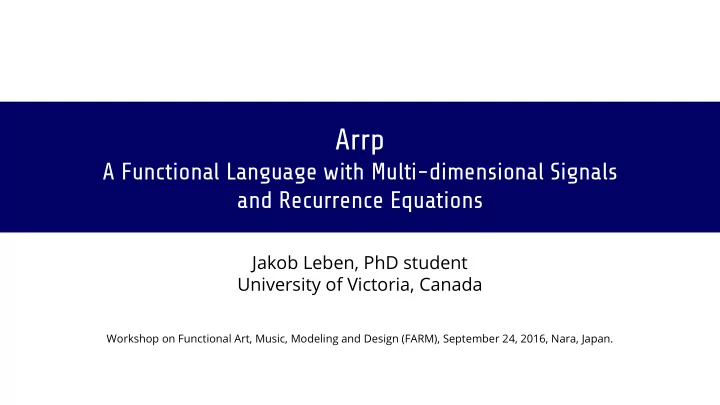

Arrp A Functional Language with Multi-dimensional Signals and Recurrence Equations Jakob Leben, PhD student University of Victoria, Canada Workshop on Functional Art, Music, Modeling and Design (FARM), September 24, 2016, Nara, Japan.
Arrp Motivation Domains: ● Audio synthesis and analysis ○ (Video, sensor arrays, communication, ○ multi-media compression) Multi-dimensional and multi-rate signals ● Good code reusability ● High performance, real-time execution ●
Arrp Solutions Signal = Infinite array (multi-dimensional) ● Array semantics inspired by MATLAB, Octave, Numpy ● Polymorphic, higher-order functions, type inference ● Polyhedral modeling and optimization [1,2,3] ● [1] Karp, Miller, Winograd. 1967. [2] Bondhugula et al. 2008. [3] Verdoolaege: Integer Set Library (ISL).
Arrp Signals as arrays 1: Sine wave: sine_wave(f) = [t -> sin(f*t*2*pi)] 2: Differentiation: d(x) = [n -> x[n+1] - x[n]] 3: Multi-rate processing: downsample(k,x) = [t -> x[k*t]]
Arrp Recursive arrays 1: Recursive use of name “y” lp(a,x) = y = [ 0 -> 0; t -> a * x[t] + (1-a) * y[t-1] ] 2: Recursion using keyword “this” lp(a,x) = [ 0 -> 0; t -> a * x[t] + (1-a) * this[t-1] ]
Arrp Multi-dimensional signals 1: 5 harmonics: a = [5,~: i,t -> sin((i+1)/sr*t*2*pi)]; b = [~,5: t,i -> sin((i+1)/sr*t*2*pi)]; 2: Differentiation across time or across channels: dt_a = [5,~: i,t -> a[i,t+1] - a[i,t]]; dc_a = [4,~: i,t -> a[i+1,t] - a[i,t]]; How to reuse functions “sine_wave” and “d”?
Arrp Array currying and partial application 1: 5 harmonics, curried: a = [5: i -> [t -> sin((i+1)/sr*t*2*pi)] ]; b = [t -> [5: i -> sin((i+1)/sr*t*2*pi)] ]; 2: Partial application: a[3] ## size [~] b[9] ## size [5]
Arrp Array currying and partial application sine_wave(f) = [t -> sin(f*t*2*pi)]; d(x) = [n -> x[n+1] - x[n]]; 1: “sine_wave” uncurried into “a” a = [5: i -> sine_wave((i+1)/sr)]; 2: “d” uncurried into “dt_a” dt_a = [#a: i -> d(a[i])];
Arrp Pointwise operations and broadcasting 1: Pointwise Broadcasting a = [5: i -> sine_wave((i+1)/sr)]; d(x) = [n -> x[n+1] - x[n]]; dc_a = d(a); ## size [4,~] 2: Pointwise and broadcasting sine_wave(f) = [t -> sin(f*t*2*pi)]; b = sine_wave([5:i -> i+1]/sr); ## size [~,5]
Arrp Array bounds inference a = [5: i -> sine_wave((i+1)/sr)]; 1: n < 5 and n + 1 < 5 n < 4 → d(x) = [n -> x[n+1] - x[n]]; dc_a = d(a); ## size [4,~] 2: i < 5 dt_a = [i -> d(a[i])]; ## size [5,~]
Arrp Classic combinators map(f,a) = [i -> f(a[i])]; scan(f,a) = [ 0 -> a[0]; i -> f(this[i-1], a[i]); ]; fold(f,a) = s[#a-1] where s = scan(f,a);
Arrp Abstraction in signal processing delay(v,a) = [0 -> v; t -> a[t-1]]; win(size,hop,x) = [t -> [size: k -> x[t*hop + k]]]; 1: Recursive LP filter: lp(a,x) = y = a*x + (1-a)*delay(0,y); 2: FIR filter: sum = fold(\a,b -> a + b); fir(k) = map(\w -> sum(w*k)) . win(#k,1);
Arrp Polyhedral scheduling Schedule u (Bondhugula et al. 2008) 1 x = [t -> f(t)]; y = [t -> x[2*t + 1] - x[2*t]]; x v y Model 2 for t = 0.. period x[t] = f(t) for u = 0.. 3 for t = 0 .. x[u] = f(u) if u % 2 == 1 y[t] = x[2*t+1] - x[2*t] y[u/2] = x[u] - x[u-1] t 4 function period() { for u = 0..1 x x[u] = f(u) y = x[1] - x[0] output(y) y }
Arrp Polyhedral scheduling FIR filter t x input x:[~]real64, coefs:[10]real64; map = ... a[t,k] = x[t+k] * coefs[k] k win = ... sum = ... fir(k) = map(\w ->sum(w*k)) b[t,0] = a[t,0] . win(#k,1); b[t,k] = a[t,k] + b[t,k-1] main = fir(coefs,x);
Arrp Polyhedral scheduling FIR filter schedule s 0 s 0 s 1 s 1 parallel prelude period
Arrp Output code generation template <typename IO> template <typename IO> class alignas(16) program inline void program<IO>::period() { { public: double x; IO * io; double main; void prelude(); double a; void period(); private: io->input_x(x); double b[4]; a = x * coefs[0]; double coefs[3]; b[2+b_ph&3] = a; int b_ph = 0; for (int c1=1; c1<=2; c1+=1) }; { a = x * coefs[c1]; template <typename IO> b[-c1+2+b_ph&3] = b[-c1+2+b_ph&3] + a; inline void } program<IO>::prelude() main = b[0+b_ph]; { io->output(main); ... io->input_coefs(coefs); ... b_ph = b_ph+1&3; } }
Arrp Experimental evaluation Legend: █ Arrp █ Hand-written C++
Arrp Future work Language: Algebraic data types ● Recursive functions ● Foreign function calls ● Performance: Multi-threading, GPU code (in LLVM?) ● Performance comparison: Faust, Kronos, StreamIt, etc. ● Extensive evaluation of polyhedral scheduling ● Applying the principles to other languages? ●
Arrp Further information Author: Jakob Leben - jakob.leben@gmail.com Evaluated Arrp and C++ Code: http://webhome.csc.uvic.ca/~jleben/farm2016 Arrp Website: http://mess.cs.uvic.ca/arrp Arrp Compiler: https://github.com/jleben/arrp
Recommend
More recommend